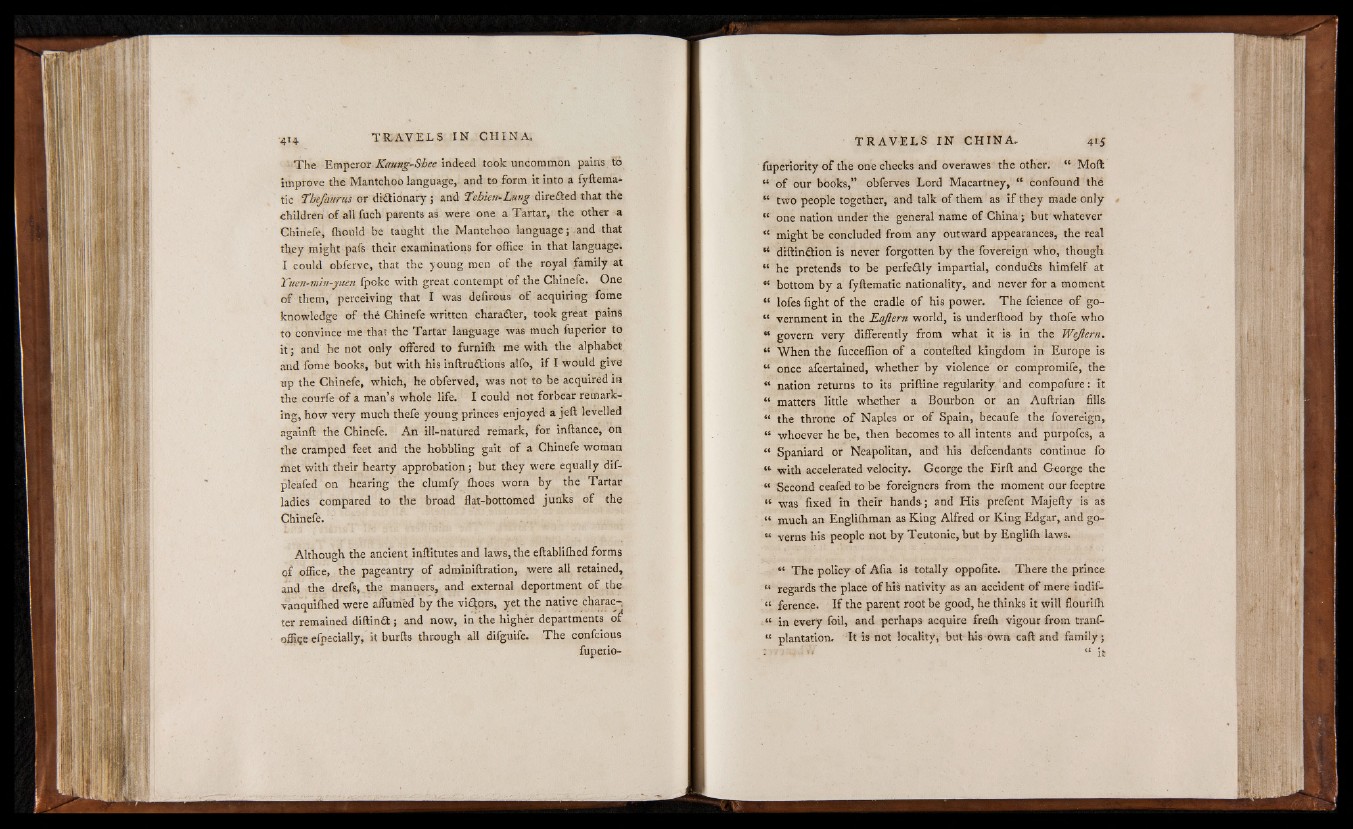
T he Emperor Knung-Shec indeed took uncommon pains to
Improve the Mantchoo language, and to form it into a fyftema-
tic Tbefanrus or diâionary ; and Ïcbicn-Lutig direiled that the
children o f all fuch parents as were one a Tartar, the other a
Chinefe, ihould be taught the Mantchoo language; and that
they might pafs their examinations for office in that language.
I could obferve, that the young men o f the royal family at
Yuen-min-yucn fpoke with great contempt o f the Chinefe. One
o f them, perceiving that I was defirous o f acquiring fome
knowledge o f thé Chinefe written character, took great pains
to convince me that the Tartar language was much fuperior to
it ; and he not only offered to furnifh me with the alphabet
and fome books, but with his inftruftions alfo, i f I would give
up the Chinefe, which, he obferved, was not to be acquired in
the courfe o f a man’s whole life. I could not forbear remarking,
how very much thefe young princes enjoyed a jeft levelled
agalnft the Chinefe. A n ill-natured remark, for inftance, on
the cramped feet and the hobbling gait o f a Chinefe woman
met with their hearty approbation ; but they were equally dif-
pleafed on hearing the clumfy ihoes worn by the Tartar
ladies compared to the broad flat-bottomed junks o f the
Chinefe.
Although the ancient inftitutes and laws, the eftabliffied forms
o f office, the pageantry o f adminiftration, were all retained,
and the drefs, the manners, and external deportment o f the
vanquiffied were affumëd by the vigors, yet the native, character
remained diftinft ; and now, in the higher departments o f
offiçe efpecially, it burfts through all difguife. T he confcious
fuperiofuperiority
o f the one checks and overawes the other. “ Moft
“ o f our books,” obferves Lord Macartney, “ confound the
“ two people together, and talk o f them as i f they made only
“ one nation under the general name o f Ch ina ; but whatever
“ might be concluded from any outward appearances, the real
“ diftinftion is never forgotten b y the fovereign who, though
“ he pretends to be perfectly impartial, conduits himfelf at
“ bottom by a fyftematic nationality, and never for a moment
“ lofes fight o f the cradle o f his power. T he fcience o f go-
“ vernment in the Eqfiern world, is underftood by thofe who
“ govern very differently from what it is- in the Wejlern.
“ When the fucceffion o f a contefted kingdom in Europe is
“ once afcertained, whether by violence or compromife, the
“ nation returns to its priftine regularity and compofure: it
“ matters little whether a Bourbon or an Auftrian fills
“ the throne o f Naples or o f Spain, becaufe the fovereign,
“ whoever he be, then becomes to- all intents and pnrpofes, a
“ Spaniard or Neapolitan, and his defcendants continue fo
u with accelerated velocity. George the Firft and George the
“ Second ceafed to be foreigners from the moment our fceptre
“ was fixed In their hands; and His prefent Majefty is as
“ much an Engliffiman as King Alfred or King Edgar, and go-
M verns his people not b y Teutonic, but by Engliih laws.
“ T he policy o f Afia is totally oppofite. There the prince
“ regards the place o f his nativity as an accident o f mere indif-
“ ference. I f the parent root be good, he thinks it will flourilh
“ in every foil, and perhaps acquire freih vigour from tranf-
“ plantation. It is not locality, but his own caft and family;
| t i J * ' ' ' “ it